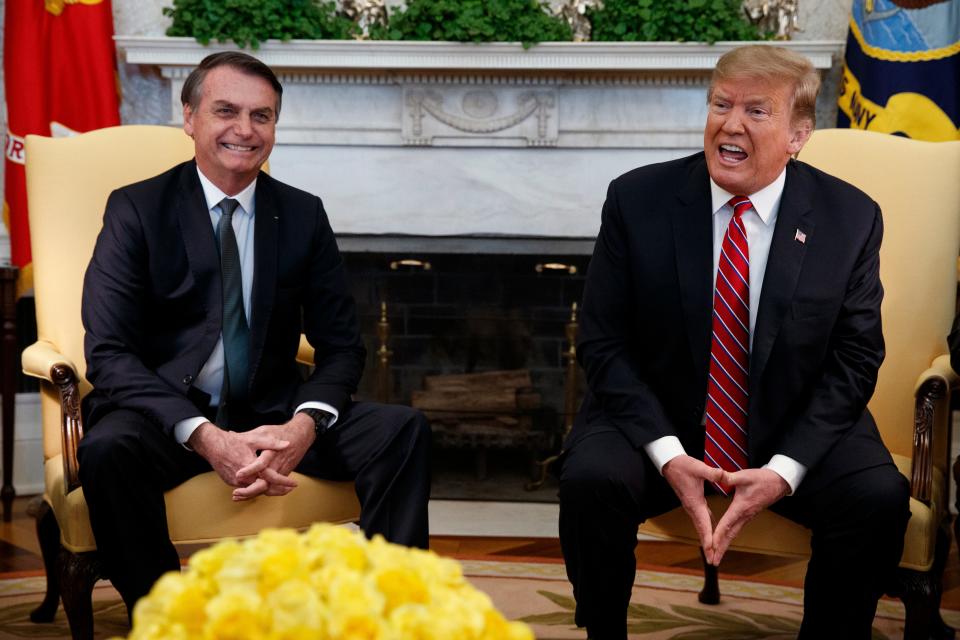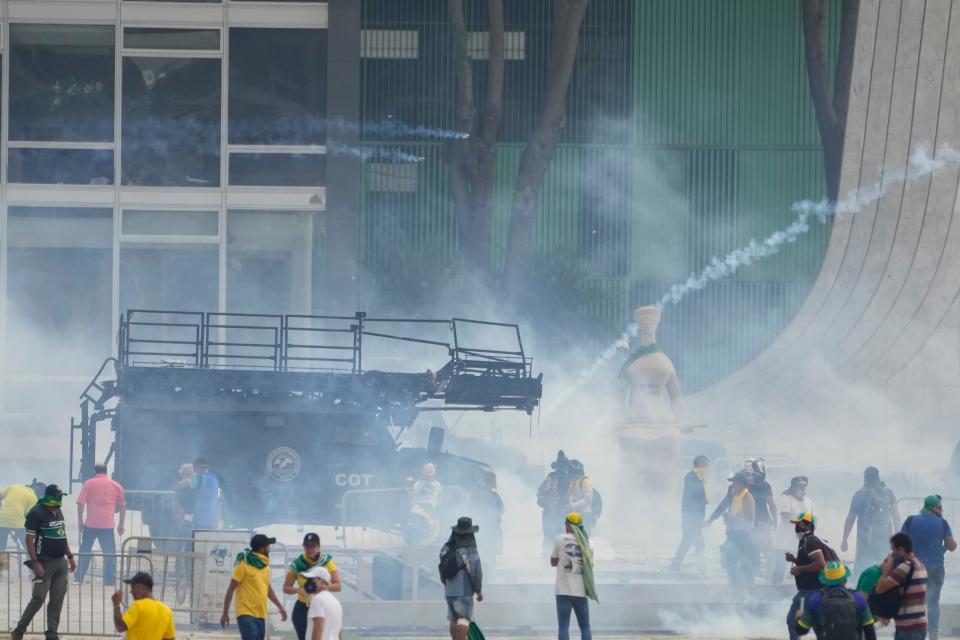Why were anti-government riots in Brazil so similar to the Jan. 6 insurrection?
- Oops!Something went wrong.Please try again later.
- Oops!Something went wrong.Please try again later.
- Oops!Something went wrong.Please try again later.
- Oops!Something went wrong.Please try again later.
- Oops!Something went wrong.Please try again later.
WASHINGTON – You can't help but notice the similarities between the Sunday attack on government buildings in Brazil and the Jan. 6, 2021, insurrection at the U.S. Capitol – including the fact both followed unproven election fraud claims by sitting presidents that sparked violence by supporters.
Like Donald Trump did in 2020, Brazilian President Jair Bolsonaro contested his defeat in October's election and sought to disallow votes cast on most of the nation’s electronic voting machines. Like Trump, the conservative firebrand claimed without merit that a software glitch had handed his leftist opponent, Luiz Inácio Lula da Silva, a rigged victory that needed to be overturned.
The violent uprising in the capital of Brasilia, including protesters smashing their way into the building where Brazil's Congress meets, followed years of alliances between Trump and his followers and Bolsonaro, who – like Trump – refused to concede his loss and is now living in Florida.
And the similarities don't end there.
Investigation of a riot:Brazil investigates after storming of Congress by backers of Bolsonaro, known as 'Trump of Tropics'
The attack in Brazil:In echo of Jan. 6 attack in U.S., Brazilian protesters storm their Congress, high court and palace
Here's how Trump and Bolsonaro – the self-styled Trump of the Tropics – came together politically and personally, and how their supporters spurred the two anti-government protests:
Trump and Bolsonaro: Similar politics, same grievances

Like the United States. Brazil's electorate includes a conservative populist wing that believes it has been exploited by economic and political elites.
Like Trump, Bolsonaro sought to lead these aggrieved populists. And with his eldest son Eduardo, he developed relationships with the American president and some of his aides, including Steve Bannon and Jason Miller.
There are also many differences, of course. There is no Electoral College in Brazil. Instead, the top two finishers in a first round of presidential balloting engage in a runoff if no candidate receives 50% of the vote.
Lula won last year's runoff with around 51% after a divisive election in which each campaign accused the other of corruption. Bolsonaro and supporters also raised questions about the fairness and accuracy of the voting system, just as Trump and his team did during the 2020 election.
Lula, a former president himself, had served 18 months in prison on corruption charges that his supporters said were cooked up by opponents; the nation's Supreme Court overturned the charges, enabling Lula to seek office again.
The Trump of the Tropics
Bolsonaro first drew comparisons to Trump when he ran for president of Brazil in 2018 and positioned himself as a populist outsider who would take on that country’s deeply entrenched political corruption and “put Brazil first.”
Like Trump, his blunt talk and self-styled firebrand image won Bolsonaro a broad support base, even if his history as a member of the Brazilian Congress since 1991 and well-heeled family upbringing suggested he was a denizen of the political swamp he wanted to drain. Bolsonaro also drew criticism for what some described as his misogynistic, homophobic and racist remarks.
As presidents, the two leaders quickly became fast friends and political allies, exchanging ceremonial sports jerseys with each other during Bolsonaro’s March 2019 visit to the White House. As Bolsonaro sat next to him, Trump told reporters he was “honored” by comparisons between the two men and their insurgent presidential campaigns. Soon, their right-wing movements merged in Brazil, thanks in part to conservative social media platforms. And Bolsonaro became one of the first world leaders to mimic Trump’s claims of “fake news” whenever information surfaced he didn’t like.
A year later, as both leaders publicly played down the dangers posed by the emerging COVID-19 pandemic, Trump and Bolsonaro met for dinner at Trump’s Mar-ago estate in Palm Beach, Florida, which resulted in many members of the Brazilian president’s team testing positive for the coronavirus. Like Trump, Bolsonaro sparred with his top public health advisers over the government’s handling of the crisis – and even fired his health minister.
How Trump and Bolsonaro handled their political defeats
After his loss, Bolsonaro stoked many of the same false claims about rigged electronic vote tabulation machines and shadowy saboteurs as Trump did. Like Trump, Bolsonaro broke with protocol and skipped his successor's inauguration.
Again, there are differences. Trump summoned his supporters to Washington for a "wild" day of protest on Jan. 6, 2021, when lawmakers would be at the Capitol certifying President Joe Biden's victory. At a rally that morning, the president told thousands of his supporters, some of them armed, to march on the Capitol and to "Fight like hell or you won't have a country anymore."
The committee investigating the attacks concluded Trump was at the center of an alleged conspiracy to try and overturn the election results using illegal means, and recommended the Justice Department prosecute him for it.
Bolsonaro has been much more subdued, according to public statements. Before departing for what is believed to be a temporary stay in Florida, he called on his supporters to avoid violence and accept Lula's victory.
“We live in a democracy or we don’t,” he said in a recorded statement shared on Youtube. “No one wants an adventure.”
Even so, Bolsonaro's supporters stormed the three pillars of Brazil’s federal government on Sunday – the presidential palace, the Congress and the Supreme Court – and brought democracy to a temporary halt. Some called for the Brazilian army to restore the far-right Bolsonaro to power and oust the leftist Lula. After Lula and his associates criticized him for fomenting an attempted overthrow, Bolsonaro took to social media to deny any involvement. "I repudiate the accusations, without evidence."
More: ‘No amnesty!’: Brazilian protests demand jail for Sunday's pro-Bolsonaro rioters
The Bolsonaro family and Trump
Bolsonaro and his son Eduardo, a Brazilian congressman, have become close to Trump and to top advisors like Bannon and Miller over the years. After his father's defeat, Eduardo met with Trump himself at his Mar-a-Lago resort last November and also spoke with Bannon and Miller during his trip to South Florida, according to The Washington Post and other media reports. He was also in Washington meeting with Trump associates in the days before the Jan. 6, 2021, insurrection.
Bannon, for his part, has used his vast media and social media presence to egg on Brazil’s pro-Bolsonaro protesters into supporting a “Stop the Steal” movement much like the one he supported in America. Miller and Bannon have worked with Eduardo Bolsonaro for years on election issues, while the younger Bolsonaro has promoted Bannon's program to spread populist nationalism in Brazil and throughout Latin America.
More: Brazil investigates after storming of Congress by backers of Bolsonaro, known as 'Trump of Tropics'

Brian Winter, a Latin America and Brazil political analyst, said there’s no indication either Jair or Eduardo Bolsonaro themselves supported the uprising, either publicly or privately.
But Bannon, a former Trump White House adviser, clearly did, and his influence may have prompted those around the Bolsonaros to act, according to Winter, who studies Brazilian politics and social media.
“It’s clear that Steve Bannon and Jason Miller had influence over Bolsonaro and his movement over many years,” Winter, editor-in-chief of Americas Quarterly, told USA TODAY. “It’s also true that watching Brazil has often felt like watching the U.S. on a two-year tape delay, especially after seeing this weekend’s events.”
“That said, it would be premature to say Bannon or Miller were somehow responsible for what happened Sunday,” said Winter.
Bannon and Miller did not respond to requests for comment.
More: Hundreds arrested in Brazil as protesters ransack government buildings in Jan. 6-style attack
For weeks before Sunday’s violent attacks on government buildings, Twitter and other social media channels in Brazil surged with the same kind of angry rhetoric that existed in the U.S. before the attack on America’s seat of democracy. Some called for people to come to the capital of Brasília for a “war cry party.” The wording of others also had similar echoes to Trump’s – and Bannon’s – calls for Trump’s supporters to come to Washington, D.C. to join in a “wild” protest of lawmakers in Congress who were certifying Joe Biden’s electoral victory.
Bannon and other Trump-style activists have long championed Bolsonaro. Bannon participated in events and meetings when the Brazilian president visited the White House in 2019.
Eduardo Bolsonaro orchestrated his father’s trip to Washington. And he has been active in Bannon's effort to use his “The Movement” to spread populist nationalism across the globe, from Hungary to Brazil.
Many ties but no accusations
There are many long-standing ties between Trump's political movement and Bolsonaro. The Conservative Political Action Conference, which has strong ties to Trump, has held conferences in Brazil for years featuring Bolsonaro, his son and their allies.
Miller, the chief executive officer of the GETTR social media platform and another former Trump aide, was detained at the airport for three hours before he and aides were allowed to board a plane back to the United States after a CPAC meeting in 2021.
"We were not accused of any wrongdoing, and told only that they 'wanted to talk,'" Miller said at the time. "We informed them that we had nothing to say and were eventually released to fly back to the United States."
US takes wait-and-see approach
White House National Security Adviser Jake Sullivan was asked Monday whether some public figures involved in the Jan. 6, 2021 attack on the U.S. Capitol were “fanning the protests that are happening in Brazil.”
“Does the U.S. see any formal or informal link between those who have may have been behind Jan. 6, and what happened on the ground there either directionally monetarily or more to support generally” the attacks on Brazil's government, a reporter asked Sullivan.
“I don't have any information in that regard,” Sullivan replied. “If we get – gain such information, we'll be sure to share with you all but as of now I've got nothing on that.”
This article originally appeared on USA TODAY: Brazil's capital stormed. Echoes of Jan. 6 insurrection reverberated

